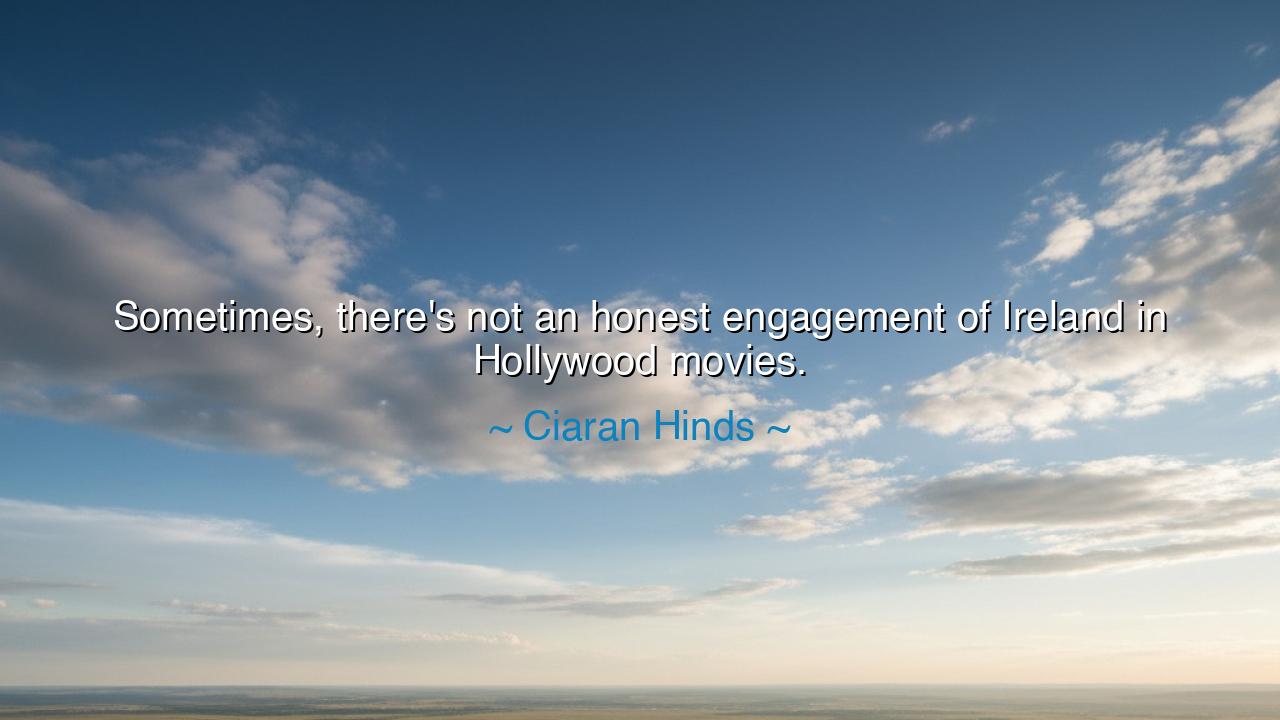
Sometimes, there's not an honest engagement of Ireland in






Hear now the words of Ciarán Hinds, who speaks with the quiet authority of one who has seen the art of cinema reflect both the truth and the distortion of reality. He said, "Sometimes, there's not an honest engagement of Ireland in Hollywood movies." These words echo a deep truth about how history, culture, and identity are often shaped not by the people who live them, but by those who seek to tell their stories from a distance. The essence of Hinds' message is that Ireland, with its rich heritage, its complex history, and its vibrant people, has often been misrepresented in the films of Hollywood—its true spirit obscured by stereotypes, simplified narratives, or even the invention of falsehoods to serve the entertainment of others.
To understand this, we must reflect on the nature of representation and authenticity in the telling of stories. In ancient times, when the great epics of Homer were shared across the land, the tales of heroes like Achilles and Odysseus were often imbued with the culture, values, and beliefs of their people. The stories that were passed down through the generations were shaped by those who lived them, who understood the land and the people, and who could speak with truth and clarity about what it meant to be a hero or a leader in their time. But as these stories spread—across regions, across cultures—they often became distorted, filtered through the lens of others who sought to impose their own understanding of the world. This phenomenon is not new, nor is it confined to Ireland. It is the same with any land or people whose story is told by those who do not live it.
Consider the story of Alexander the Great, who, though he conquered much of the known world, was often misunderstood by those who encountered him. To the Greeks, he was a hero—a symbol of courage, conquest, and glory. To the people of Persia, whom he invaded, he was a foreign conqueror, an outsider who sought to change their way of life. In the tales passed down, Alexander’s greatness was often framed in ways that ignored the complexity of the lands he encountered, the diverse cultures he tried to rule. The same can be said of Ireland, whose rich and layered history cannot be captured in the narrow strokes of a Hollywood film. What Hollywood often portrays is a simplified or romanticized version of the Irish story, shaped not by the Irish people, but by the imagination of outsiders.
Think of the great Irish literary tradition, where writers like James Joyce, W.B. Yeats, and Seamus Heaney captured the true spirit of the land and its people—not through stereotypes, but through deep, personal engagement with the complexities of Irish life. They did not write to entertain, but to illuminate, to offer a truth that could only come from living the Irish experience. When Hinds speaks of a lack of honest engagement with Ireland in Hollywood movies, he calls us to recognize that true stories, true representations, come from authentic experience, not from the fantasies or prejudices of those who only visit or imagine a place.
There is a valuable lesson here for all of us, whether we are telling our own stories or seeking to understand the stories of others. We must approach every narrative, whether in film, literature, or conversation, with a deep sense of respect for the truth of those involved. It is too easy to fall into the trap of presenting a simplified or skewed version of a place or a people, especially when profits, stereotypes, and entertainment become the driving forces. True understanding requires an honest engagement—a willingness to learn, to listen, and to embrace the complexity of the world around us.
In our own lives, we are all storytellers. We create our own narratives—whether in how we represent ourselves, our culture, or our values. Let us be mindful of the stories we share, making sure that they reflect the fullness of who we are, not just the easy or comfortable parts. Like Ciarán Hinds, we must call out the misrepresentations that limit us and demand a deeper, more honest engagement with the world around us. Whether we speak of Ireland, or ourselves, or the land we call home, our stories must reflect the truth, the complexity, and the beauty of the world we live in.
Thus, O children of the future, take this lesson to heart: when you share your own story, or the story of others, do so with honesty, with a deep understanding of the complexities that make us who we are. Do not settle for the easy version, the stereotype, or the image that the world often asks you to adopt. Strive for truth, and in doing so, you will create stories that endure, that inspire, and that show the world the real beauty of the places and people that shape us. May your lives, like the greatest stories ever told, be reflections of authentic engagement with the world around you.






AAdministratorAdministrator
Welcome, honored guests. Please leave a comment, we will respond soon